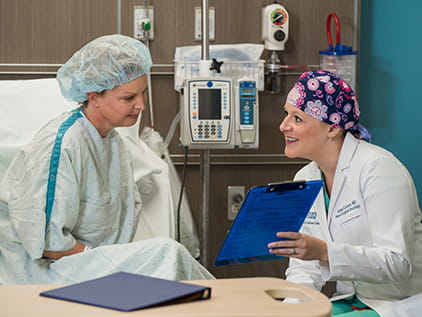Alcohol Use Disorder
Consuming any amount of alcohol comes with risks: impaired decision-making, mood changes, decreased coordination and more. More significantly, consuming even moderate amounts of alcohol frequently can lead to dependence or addiction. This is called alcohol use disorder.
Nearly 30 million people in the US have alcohol use disorder, and the rate of alcohol addiction has been rising in recent years. Almost 1/3 of adults will meet the criteria for AUD at some point in their lives.
You may suffer from alcohol use disorder if you have built up a tolerance to alcohol or experience withdrawal when you stop drinking. AUD can lead to strained relationships, anxiety and depression, but it also has potential physical effects like liver disease and certain forms of cancer, including:
What is alcohol use disorder?
AUD is diagnosed by healthcare professionals when your drinking leads to significant challenges and harm. It is a disease where you are suffering from an addiction to alcohol and experiencing mental and physical effects.
Alcohol use disorder affects brain function, the digestive system and the immune system among other things.
We offer a variety of appointment types. Learn more or call 913-588-1227 to schedule now.
Types of alcohol use disorder
Alcohol use disorder can be mild, moderate or severe.
Alcohol use disorder symptoms and risks
There are many symptoms of alcohol use disorder, including drinking that is out of control. This means you drink more than you intended to, or you want to stop drinking but can’t.
Another symptom is engaging in unsafe activities that you would not do if you weren’t drinking. You may also notice an increase in your tolerance – that’s when you drink more in order to feel the same effects of the alcohol.
Finally, when you aren’t drinking you might experience symptoms like irritability, anxiety, depression, nausea and sweating.
Your risk of AUD increases with the more alcohol you consume. The National Institute on Alcohol Abuse and Alcoholism recommends that men younger than 65 drink no more than 4 drinks per day and no more than 14 drinks per week. The recommended limits for women of any age and for men 65 years and older are no more than 3 drinks per day and no more than seven drinks per week. More than this is considered heavy drinking.
You may also be more at risk if you:
- Started drinking before the age of 15
- Have a family history of alcohol addiction
- Experienced childhood trauma
- Have a diagnosis of depression, post-traumatic stress disorder, attention deficit hyperactivity disorder or another psychiatric condition that may be associated with AUD

Surprising things about alcohol use
Did you know there are no health benefits linked to drinking alcohol?
Alcohol use disorder diagnosis and screening
Wellness visits include questions about your alcohol consumption. Your primary care specialist, or another provider, can help screen your alcohol use behaviors and identify any potential symptoms you are experiencing.
It’s important to note that you may not have all the symptoms but still have alcohol use disorder. Doctors will ask you questions, based on a set of 11 internal and external criteria, to diagnose whether it is mild, moderate or severe AUD.
You will also get a full physical exam and health history to determine if further diagnostic tests are needed. To check for potential liver damage, a doctor may order an ultrasound, CT scan or MRI. If cancer is a possibility, additional screenings, like a biopsy, could be ordered.

Cancer care you can count on
The University of Kansas Cancer Center is 1 of fewer than 60 NCI-designated comprehensive cancer centers in the nation, and it's part of The University of Kansas Health System.
Alcohol use disorder treatment
The addiction treatment program at The University of Kansas Health System offers medications in addition to counseling and psychotherapy to treat alcohol use disorder.
Some commonly used medications are:
- Naltrexone
- Vivitrol, a once-a-month intramuscular injectable naltrexone
- Disulfiram
- Acamprosate
- Topiramate
Alcohol use disorder treatment may be offered on an outpatient basis or as part of select in-patient treatment plans.
Why choose us for alcohol use disorder
Our specialists engage in ongoing research, training and education to provide the best evidence-based treatments for addiction, liver disease and cancer, among other things.
For alcohol use disorder, we integrate behavioral changes through things like talk therapy, with medications and medical treatments for any physical conditions. Your psychiatrist can collaborate with primary care on treating AUD. You can work with leading specialists at The University of Kansas Cancer Center. Or, in the case of end-stage liver disease, you may work with the liver transplant team. Everything you need to treat AUD is available at the health system.
Your alcohol use disorder care team
Since 1966, The University of Kansas Health System has offered outpatient addiction treatment. Learn more about addiction psychiatry.
Our physicians are recognized leaders in the diagnosis and treatment of gastrointestinal or digestive system disorders that affect the esophagus, stomach, intestines, colon, gallbladder and other related organs. Learn more about gastroenterology.
We have a highly skilled hepatology team that includes physicians who specialize in liver disease. Learn more about hepatology.
We participate in one of the 25 nationally recognized regions for Primary Care First. Primary Care First is an alternative payment model that prioritizes patients by emphasizing the clinician-patient relationship. Learn more about internal medicine.
If you need cancer diagnosis and treatment, you can work with our world-class oncologists and cancer care team. Learn more about The University of Kansas Cancer Center.




